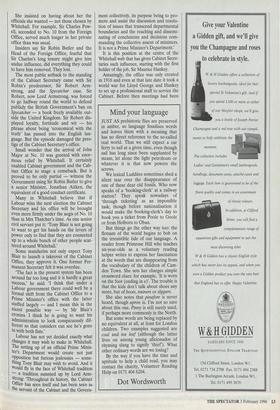Mind your language
JUST AS prehistoric flies are preserved in amber, so language fossilises words and leaves them with a meaning that has no direct reference to the so-called real world. Thus we still expect a car ferry to sail at a given time, even though sail has long since been supplanted by steam, let alone the light petroleum or whatever it is that now powers the screws.
We lexical Luddites sometimes shed a silent tear over the disappearance of one of these dear old fossils. Who now speaks of a 'booking-clerk' at a railway station? They speak nowadays of `through ticketing' as an impossible task; though before nationalisation it would make the booking-clerk's day to book you a ticket from Poole to Goole or from Holborn to Oban.
But things go the other way too: the flotsam of the world begins to bob on the irresistible tide of our language. A reader from Primrose Hill who teaches six-year-olds as a voluntary reading helper writes to express her fascination at the words that are disappearing from the vocabulary of the children of Cam- den Town. She sets her charges simple crossword clues: for example, 'It is worn on the foot (ending in e)' . The trouble is that the kids don't talk about shoes any more, but of boots, trainers or slippers.
She also notes that pinafore is never heard, though apron is. I'm not so sure about this one. Pinny is still surely used, if perhaps more commonly in the North.
But some words are being replaced by no equivalent at all, at least for London children. Two examples suggested are coal and tea leaf (although the latter lives on among young aficionados of rhyming slang to signify 'thief). What other ordinary words are we losing?
By the way if you have the time and aptitude to help a child read, you may contact the charity, Volunteer Reading Help on 0171 404 6204.
Dot Wordsworth


































































 Previous page
Previous page